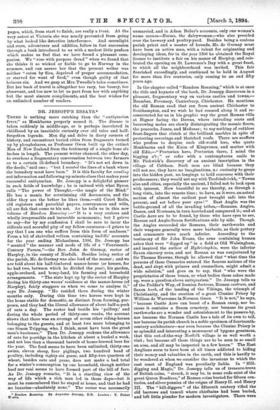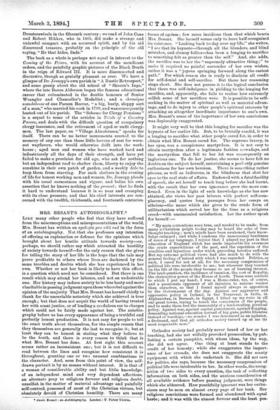DR. JESSOPP'S ESSAYS.*
THERE is nothing more catching than the "antiquarian fever," as Monkbarns properly named it. The disease is taken suddenly in middle-age, or is perhaps inoculated in childhood by an insatiable curiosity over old tales and half- forgotten legends. Men dig and delve in dusty corners of history, and reconstruct buried cities from fragments turned up by ploughshares, as Professor Owen built up the extinct Moa of New Zealand from the testimony of a single bone six inches in length. The present writer chanced, the other day, to overhear a fragmentary conversation between two farmers as to a certain ill-defined boundary. "It's not set down in the deeds," said one ; "but I scented the lines of a bank where the boundary must have been." It is this faculty for scenting out information and following up minute clues that makes your successful antiquarian. Dr. Jessopp is a delightful pioneer in such fields of knowledge ; he is imbued with what Byron calls "The power of Thought,—the magic of the Mind." He has a mania for scrutinising old documents, and the older they are the better he likes them,—old Court Rolls, old registers and parochial papers, conveyances and wills, all are fish that come to his net. As he tells us in this new volume of Random Roaming :—" It is a very curious and wholly irrepressible and incurable monomania; but I grieve to say—for by my confession I shall be sure to incur the ridicule and scornful pity of my fellow-creatures—I grieve to say that I am one who suffers from this form of madness." From a bit of shrivelled vellum containing bailiffs' accounts for the year ending Michaelmas, 1306, Dr. Jessopp has " scented" the manner and mode of life of a "Fourteenth- Century Parson,"—the Rev. John de Gurnay, rector of Harpley, in the county of Norfolk. Besides being rector of the parish, Mr. de Gurney was also lord of the manor ; and we are told about his half-timbered manor-house (or houses, for he had two, between which he divided the year), his garden, apple-orchard, and hemp-land, his farming and household arrangements. "The state kept up by the rector of Harpley during his thirty-one weeks' residence at the manor-house (of Harpley), fairly staggers us when we come to analyse it," says Dr. Jessopp. "He resided there during the winter months only. During this time two horses were kept in the home stable for domestic, as distinct from farming, pur- poses, and they had the liberal allowance of about half-a-peck of oats a day. The rector had beside his palfrey,' and during the whole period of thirty-one weeks, the account shows that there was an average of seven other riding-horses belonging to the guests, and at least two more belonging to one Simon Tripping, who, I think, must have been the great man's huntsman." Then Dr. Jessopp reckons the allowance of oats for porridge in the kitchen at about a bushel a week, and not less than a thousand barrels of home-brewed beer for the year. The food seems to have been unlimited, thirty-one swine, eleven sheep, four piglings, two hundred head of poultry, including eighty-six geese, and fifty-two quarters of wheat, besides oats and pease, does not make a bad total for a winter's consumption by one household, though neither beef nor veal seems to have formed part of the bill of fare. As Dr. Jessopp remarks, "it is a startling view of the way of life which a rich man led in those days—but it must be remembered that he stayed at home, and that he had no luxuries—absolutely none." The rector was necessarily . Rana= Roam*. By Augustus Jes3opp, D.D. Loudon T. Fisher traniu.
unmarried, and in Adam Bullies accounts, only one woman's name occurs—Emma, the dairywoman—who also presided over the brewery and poultry-yard. Besides being a zealous parish priest and a master of hounds, Mr. de Gurnay must have been an active man, with a talent for originating and developing ideas, for in the year 1306 he obtained the Royal licence to institute a fair on his manor of Harpley, and cele- brated the opening on St. Lawrence's Day with a great feast, to which all the neighbourhood was invited. This fair flourished exceedingly, and continued to be held in August for more than five centuries, only coming to an end fifty years ago.
In the chapter called "Random Roaming," which is at once the title and keynote of the book, Dr. Jessopp discourses in a pleasant, fragmentary way on various castles and towns,— Bramber, Pevensey, Canterbury, Chichester. He mentions the old Roman road that ran from ancient Chichester to Southampton, and we wish he had roamed along it and re- constructed for us in his graphic way the great Roman villa at Bignor facing the Downs, where intruding roots and burrowing moles are slowly disintegrating the mosaic floors, the peacocks, Junos, and Medusas ; to say nothing of ruthless frost-fingers that clutch at the brilliant marbles in spite of protecting coverings and thatched roofs. There are scoffers who profess to despise such old-world lore, who quote Monkbarns and the Kaim of Kinprunes, and mutter with old Edie,—" Prsetorian here, Prmtorian there, I mind the bigging o't; " or refer with a contemptuous smile to Mr. Pickwick's discovery of an ancient inscription in the village of Cobham. Such men are blind because they will not see, they have no imaginations, na curiosity to grope into the hidden past, no longings to hold converse with their predecessors; they would not say with Teufelsdriackh, " Towns also and cities, especially the ancient, I failed not to look upon with interest. How beautiful to see thereby, as through a long vista, into the remote time; to have, as it were, an actual section of almost the earliest past brought safe into the present, and set before your eyes !" East Anglia was the battle-ground of all the invading tribes,—Romans, Angles, Danes, and Normans, in turn harried and conquered it; and at Castle Acre are to be found, by those who have eyes to see, Roman and Anglo-Saxon fortifications side by side. Though the Angles succeeded the Romans, their earthworks and their weapons generally were more barbaric, as their pottery and ornaments were much inferior. According to the testimony of Sir John Evans, the urns containing human ashes that were " digged up" in a field at Old Walsingham, and inspired the author of Hydriotaphia, were the inferior Saxon cinerary urns, and not Roman as was conjectured by Sir Thomas Browne, though he allowed that "what time the persons of these Ossuaries entered the famous nations of the dead, and slept with princes and counsellors, might admit a wide solution," and goes on to say, that "who were the proprietaries of these bones, or what bodies these ashes made up, were a question above antiquarism." Dr. Jessopp tells us of the Peddar's Way, of Icenian fortress, Roman castrum, and Saxon burh, of the landing of the Vikings, the triumph of Christianity, and the erection of a great Cluniac Priory by William de Warrenne in Norman times. "it is not," he says, "because Castle Acre can boast of a Roman camp, nor be- cause it contains a Saxon cemetery, nor because its great earthworks are a wonder and astonishment to the passers-by, nor because the Norman Castle has a tale of its own to tell, nor because its parish church is a noble specimen of fourteenth- century architecture—nor even because the Cluniac Priory is so splendid and interesting a monument of bygone greatness, that this out-of-the-way Norfolk village is so well worth a visit; but because all these things are to be seen in so small an area, and all may be inspected in a few hours." The East Anglians seem to have been at all times addicted to hiding their money and valuables in the earth, and this is hardly to be wondered at when we consider the invasions to which the east coast of England was peculiarly liable. In "Hill- digging and Magic," Dr. Jessopp tells us of treasure-trove of British coins, "struck, it may be, in some rude mint of the great Queen Boadicea," of Roman coins buried for fifteen cen- turies, and silver pennies of the reigns of Henry II. and Henry ILL The " hill-diggers " of the fifteenth century rifled the old barrows and tumuli where chieftains had been buried, and left little plunder for modern investigators. There were
Donsterswivels in the fifteenth century ; we read of John Cans and Robert Hikkes, who in 1465, did make a strange and unlawful compact with an accursed spirit, and by his aid discovered treasure, probably on the principle of the old saying, "He that hides, finds."
The book as a whole is perhaps not equal in interest to the Coming of the Friars, with its account of the mendicant orders, and the painfully graphic pictures of the Black Death in the reign of Edward III. It is more disconnected and discursive, though as genially pleasant as ever. We have a glimpse of Dr. Jessopp's own parish in "A Rustic Retrospect," and some gossip about the old school of " Skeorn's Inga," where the late Baron Alderson began the famous educational career that culuminated in the double honours of Senior Wrangler and Chancellor's Medallist ; and a ehronigue seandaleuse of one Parson Beevor, "a big, burly, sloppy sort of a man," who married his cook in 1799, and was consequently hooted out of his parish. The "Scheme for Clergy Pensions" is a sequel to some of the articles in Trials of a Country Parson, and deals with the difficult question of compulsory clergy insurance, and the retirement of aged or unfit clergy- men. The last paper, on "Village Almshouses," speaks for itself. There can be no better monuments erected to the memory of any one than those little havens of rest for worn- out wayfarers, who would otherwise drift into the work- house; aged men and women who have worked hard and industriously all the days of their strength, and have yet failed to make a provision for old age, who ask for nothing but an independent roof to shelter them, liberty to enjoy the sunshine in their own patch of garden, and a weekly dole to keep them from starving. For such shelters in the evening of life for honest working men and women, Dr. Jessopp pleads with his usual earnestness and vigour, and belies his own assertion that he knows nothing of the present ; that he finds it hard to understand because it is so near and cramping with its close pressure, and that his chief interests are con- cerned with the twelfth, thirteenth, and fourteenth centuries.







































 Previous page
Previous page